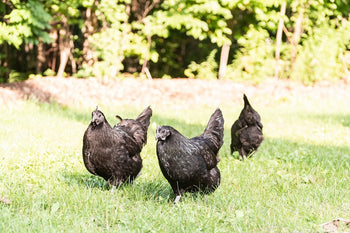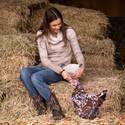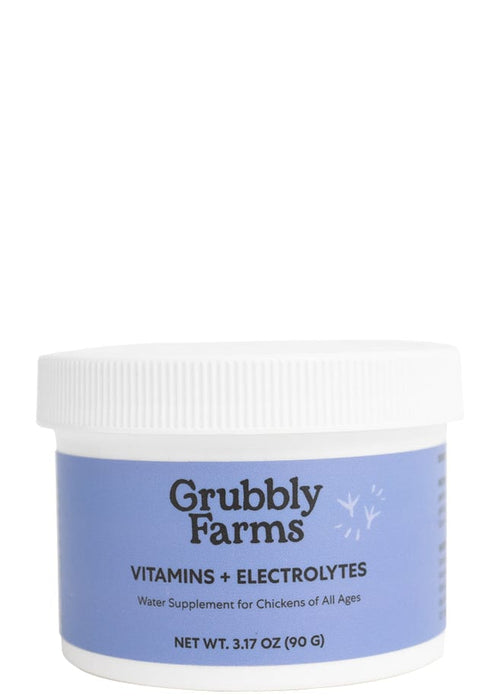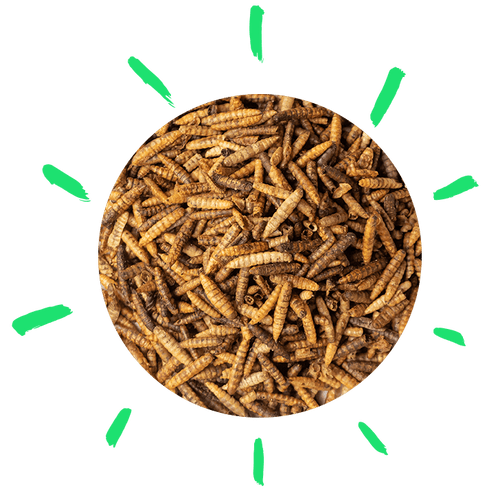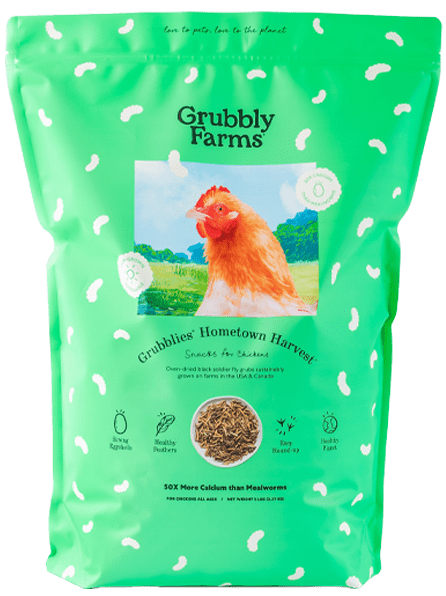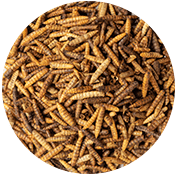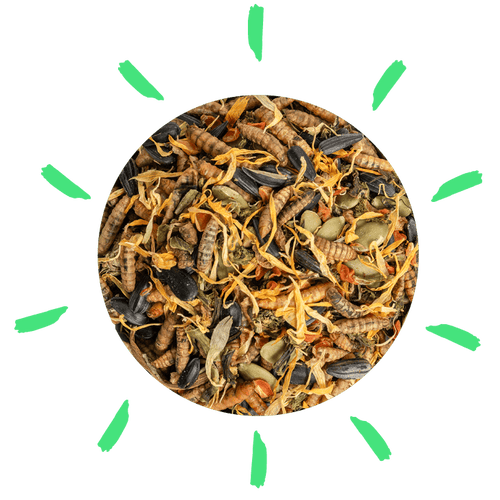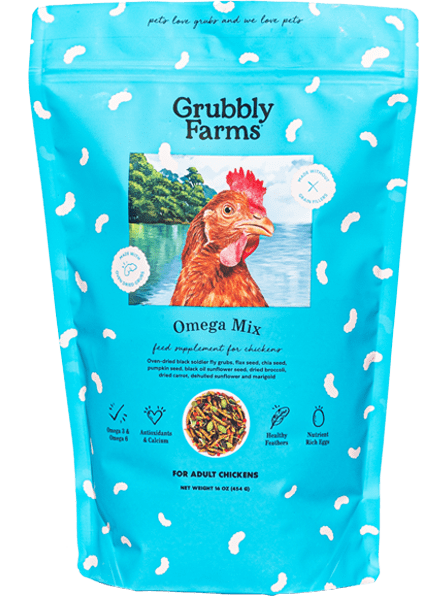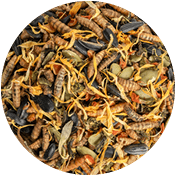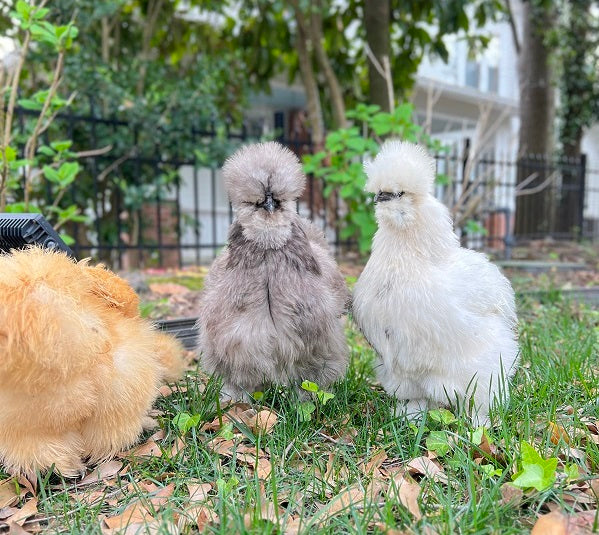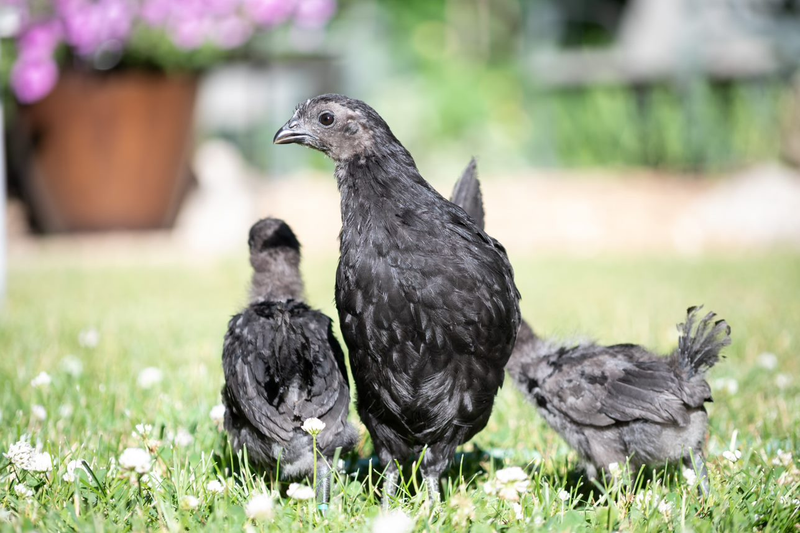Do you know what it looks like when a chicken sneezes? Chances are you have seen a couple of your hens sneeze if you spend time watching your flock going about their daily activities. A chicken sneeze is a loud expulsion of air, often accompanied by a violent head shake and sometimes closed eyes while the chicken is sneezing.
While this may seem like a very violent reaction for such a small animal, a chicken sneezing is not always cause for concern. Inevitably, chickens will sneeze on occasion. However, when sneezing becomes a persistent or widespread occurrence, you may want to consider some more serious issues that can cause chickens to sneeze. Let’s explore why chickens sneeze and how you can help keep your flock healthy!

Why Do Chickens Sneeze?
Chickens sneeze for the same reason that we do. They are trying to expel irritants from their respiratory system and nasal passages. Whenever a chicken inhales an irritant, it causes the sudden reaction of sneezing.
Three main irritants can cause a chicken to sneeze:
#1. Dust & Debris- In a chicken’s natural environment, it inhales dust, dirt, and other small particles that can become irritants. Chickens are exposed to these irritants when they forage and spend time outside. There can also be dust and debris irritants in the chicken coop. Dusty feed or dusty litter can irritate a chicken’s respiratory system when inhaled. Pollen can also cause chickens to sneeze. While it is unknown whether or not chickens can have seasonal allergies, it is certainly possible for seasonal pollen to cause a sneezing reaction due to irritating a chicken’s sensitive respiratory system.
#2. Environmental Factors- Irritants that cause chickens to sneeze can also be airborne and practically invisible to the naked eye. Environmental airborne irritants can include polluted air and ammonia fumes. Smoke and smog can be irritants that cause poor air quality and trigger sneezing in chickens. Sudden, extreme temperature changes can also irritate a chicken’s sensitive respiratory system and cause an increase in sneezing.
#3. Infectious Agents- The third general cause of sneezing in chickens is infectious agents. These are the most severe irritants that cause sneezing because they can cause disease. Sneezing is a symptom of different poultry diseases and respiratory issues. Bacterial, viral, and fungal infections can all cause chickens to sneeze. Viral infections are the most contagious and the most serious infections to deal with. Check for other symptoms of illness to determine if infectious agents caused the sneezing.

Is Sneezing Always a Cause for Concern?
Dust and debris, environmental factors, and infectious agents can all trigger a chicken to sneeze. Of the three general triggers, infectious agents would be the most significant cause for concern.
An occasional sneeze from a flock member or two should be no reason to be concerned. Chickens have very sensitive respiratory systems, and they often live in an environment where respiratory irritants are inevitably present. Even a sudden fit of sneezes could just mean that the hen couldn’t expel the irritant with the first sneeze, so she ends up sneezing multiple times.
If you notice more consistent or widespread sneezing, you should start taking proactive measures to identify the reason for the frequent sneezing. Coughing or gasping are also symptoms of illness that can be mistaken for sneezing.
Deciphering the Sneezing Situation
Here are some factors to consider if you are concerned about a sneezing chicken in your flock:
Environment- Consider if the chicken was in an area with a lot of airborne irritants. The presence of dust, pollen, smoke, or fine dirt could explain the sneezing.
Coop- If the chicken was in the coop, consider the environment within the coop. Riled litter and ammonia fumes can cause sneezing. Usually, a step outside and a breath of fresh air will alleviate the hen’s sneezing.
Temperature Swings- A sudden change to cold weather can often cause sneezing to become more prevalent.
Multiple Birds- Consider if numerous birds are frequently sneezing. This could mean a widespread trigger, such as polluted air or a contagious infectious agent.
Behavior- Seeing a chicken sneeze can seem distressing at first. In sporadic sneezing cases, the hen should resume her normal activities, which would mean the sneezing trigger is probably of no need for concern. However, if the hen sneezes frequently and starts acting ill or lethargic, you should start considering more serious causes of the sneezing.
Other Symptoms- Accompanying a behavior change may be the presence of other symptoms of illness. Sneezing paired with other signs of illness or disease will necessitate immediate action.
Occasional vs. Persistent Sneezing
It is helpful to decipher between occasional and persistent sneezing in chickens. Distinguishing between the two can be tricky, but there are some characteristics to watch for when deciding if that chicken sneeze is serious or not.
An occasional sneeze is normal for a healthy chicken. An occasional sneeze should be a one-time occurrence, followed by the chicken resuming its normal activities. Several repeated sneezes are also typical for more stubborn irritants. Airborne irritants or seasonal changes in the weather can lead to periodic sneezing. Occasional sneezes don’t necessitate any action on your part other than making sure the hen is acting normally.
If a chicken sneezes more frequently in a specific environment and changing the environment alleviates the sneezing, consider the environmental factors that are triggering the more frequent sneezing. Ammonia fumes, dusty litter in the coop, or poor air ventilation in the coop or brooder can all lead to conditional sneezing. While conditional sneezing is often not as serious as persistent sneezing, address it promptly for the health of your flock.
Sneezing that is persistent or widespread throughout the flock should cause serious concern. If a change in environment does not alleviate the sneezing and continues to be persistent, consider these causes for persistent sneezing in chickens:
- Fungal Triggers- brooder pneumonia (chicks)
- Bacterial Triggers- Infectious coryza, Chronic respiratory disease
- Viral Triggers- Marek’s disease, Newcastle disease, Laryngotracheitis, Infectious bronchitis, Avian flu
- Metabolic Triggers- roup
- Protozoal Triggers- canker, Cryptosporidiosis

Identifying Other Symptoms (Connecting the Dots: Symptoms to Watch For)
Frequent sneezing often means an infectious and potentially dangerous trigger causes the sneezing. When infectious triggers cause sneezing, it is often not the only symptom exhibited by the chicken infected. Watch out for a change in the chicken’s behavior or the persistent sneezing becoming more common throughout the entire flock.
Here are some other symptoms to watch out for that would indicate further respiratory distress:
- Labored breathing
- Sniffling
- Gasping
- Coughing
- Wheezing
- Runny nose
- Watery/foamy eyes
Sneezing accompanied by one or more of these additional respiratory symptoms usually means that the chicken is suffering from a more serious infection or disease. Consult an avian vet or veterinarian to help you diagnose the cause of sneezing in your flock.
Chickens with a known chronic disease, such as avian chronic respiratory disease, will be more prone to sneezing frequently. Chickens with a chronic illness often can’t be cured of their disease, but they can still live a quality life as long as you minimize the triggers. Chickens with chronic respiratory disease will be more sensitive to sneezing triggers such as temperature changes and polluted air.
How to Prevent Sneezing in Chickens
Preventing sneezing in chickens can be done by reducing exposure to sneezing triggers and promoting good health in your flock. There are several ways you can reduce your flock’s exposure to sneezing triggers in their natural environment.
Improve Coop Conditions- Start by ensuring your flock’s coop is always clean and well-ventilated. Use low-dust coop litter (such as hemp) and do frequent litter changeouts to prevent the litter from collecting chicken dust or breaking down into fine particles. Large flake wood shavings or straw make good low-dust litter options.
By frequently cleaning the coop and ensuring good ventilation within the coop, you can prevent ammonia fumes from building up. Proper cleaning will remove the source of ammonia (chicken poop), and good ventilation will promote air exchange within the coop.
Balanced Diet & Hydration- Feeding your flock a balanced diet and ensuring they always have access to plenty of fresh, clean water can help promote overall good health in your flock. If you suspect one of your chickens isn't getting enough water, an electrolyte supplement can help. A healthy diet means a healthy immune system. When a chicken’s immune system is strong, it can ward off disease-causing pathogens.
Using a low-dust feed can also help reduce dust within the coop. Low-dust feed can be a pellet chicken feed, a whole-grain chicken feed, or a combination of pellets and whole grains. Chicken feed that is usually more high-dust includes crumbles or processed grain feed.
Health Checks- Performing frequent health checks on all the birds in your flock can help you catch some health issues before they become serious. If you notice that a chicken has nasal discharge, has lost weight, or has a faded-looking comb and wattles, these are symptoms of a potential underlying health problem.
Natural Supplements- Incorporating natural supplements into your flock’s diet can also help keep them healthy and boost their immune system. Supplements such as elderberry syrup, echinacea, garlic, peppermint, or licorice root can all help support a healthy respiratory system and alleviate occasional sneezing. VetRx is also a natural product that can help relieve respiratory distress in chickens. None of these supplements can treat serious diseases, but they can help your flock maintain a robust immune system and a healthy respiratory system.
Quarantine New Additions- If you are adding new chickens who come from a different flock to your flock, you should quarantine the new birds before adding them to your flock. A quarantine period of at least three weeks is usually adequate. Quarantining gives you time to watch the new birds for signs of illness or disease that could spread to your flock.
Quarantine in an area where the new birds have zero exposure to your flock. Care for your flock before caring for the quarantined birds to prevent accidentally spreading pathogens on your shoes or clothing. If the new birds appear healthy and are parasite-free, you can start integrating them into your flock after three weeks of quarantine.
Consult a Veterinarian- If you are concerned about persistent or widespread sneezing in your flock, consult an avian expert or veterinarian. Professional help can allow you to get an accurate diagnosis and inform you how to treat underlying health problems.
Conclusion:
Why do chickens sneeze? Chickens will sneeze on occasion whenever they inhale an irritant. Chickens have susceptible respiratory systems, so particles like dust, pollen, or even smoke can cause a chicken to sneeze once or multiple times. If you notice persistent sneezing or widespread sneezing in your flock, you should monitor your chickens closely to watch for other signs of disease or illness.
Prevent sneezing from becoming an issue in your flock by keeping the coop clean and practicing good biosecurity! Always consult an avian expert or veterinarian if you suspect a chicken’s sneezing indicates a more serious health condition.





